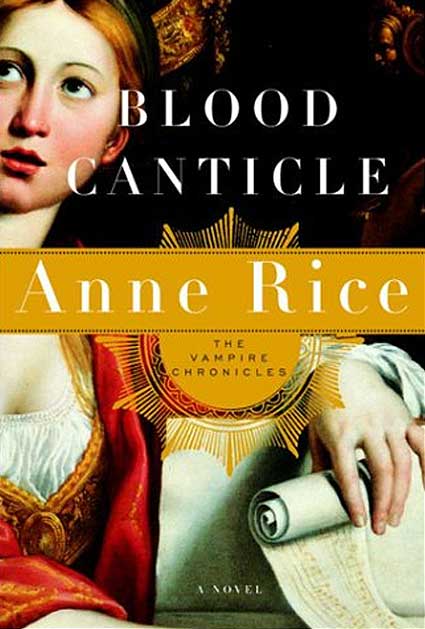Anne Rice continues her astonishing Vampire Chronicles in a new novel that begins where Blackwood Farm left off — and tells the story of Lestat’s quest for redemption, goodness, and the love of Rowan Mayfair.
Welcome back to Blackwood Farm. Here are all of the brilliantly conceived characters that make up the two worlds of vampires and witches: Mona Mayfair, who’s come to the farm to die and is brought into the realm of the undead; her uncle, Julian Mayfair, guardian of the family, determined to forever torment Lestat for what he has done to Mona; Rowan Mayfair, brilliant neurosurgeon and witch, who finds herself dangerously drawn to the all-powerful Lestat; her husband, Michael Curry, hero of the Mayfair Chronicles, who seeks Lestat’s help with the temporary madness of his wife; Ash Templeton, a 5,000-year-old Taltos who has taken Mona’s child; and Patsy, the country-western singer, who returns to avenge her death at the hands of her son, Quinn Blackwood. Delightfully, at the book’s centre is the Vampire Lestat, once the epitome of evil, now pursuing the transformation set in motion with Memnoch the Devil. He struggles with his vampirism and yearns for goodness, purity and love, as he saves Patsy’s ghost from the dark realm of the Earthbound, uncovers the mystery of the Taltos and unselfishly decides the fate of his beloved Rowan Mayfair.
A story of love and loyalty, of the search for passion and promise, Blood Canticle is Anne Rice at her finest.
Synopsis courtesy of randomhouse.com/knopf
THE AUTHOR'S POINT OF VIEW ON BLOOD CANTICLE
Anne Rice writes exclusively to web site visitors about her thoughts on BLOOD CANTICLE.
Thoughts on BLOOD CANTICLE: Message #1
"Sunday, December 14, 2003
Hello Guys. Now that Blood Canticle has been out some time, I think it's safe for me to make a few comments on the book for those of you who might want the author's point of view on it. This is highly informal, please understand, in keeping with the tone of this website and I hope it may interest someone.
Each of the Vampire Chronicles involves a challenge. Each is distinctly different from the other books. The Tale of the Body Thief followed the panorama of Queen of the Damned with a tight, lyrical tale. And Blood Canticle comes after the sprawling and dense Blackwood Farm with a personal song from Lestat. I feel the vitality of the book is located in its voices. Not only is Lestat speaking more candidly than ever before, he is also delivering the candid voices of others around him who delight him or torment him. Through him the warmth and life of Blackwood Farm continues to radiate even as he knows his retreat there can only be temporary. The hunting chapters, those in which he prowls the big hotels, first for a lone woman victim, second for a powerful drug dealer and pimp at a cocktail party are the most intimate chapters I've ever written with Lestat, and I heard them outloud as I wrote, carefully paring them down until the rhythm for me was near to perfect. After Lestat takes the lone woman, his vision of the ice cubes in the glass, of the window as he breaks it to exit the hotel -- these things are in a temporary rapture. At the pimp's party, he is an outsider, feasting on the tragic ironies of the spectacle until it climaxes for him as he leaves the hotel altogether and sees the happy unconcerned mortals on the sidewalks. These chapters reminded me personally of many others in my earlier books, but in none did I get so close to Lestat except perhaps in one in The Vampire Lestat where he begins with "I dreamed the dream of Family." If I ever read aloud from this book again (I did read fragments on tour), it will be from these chapters. The music of the book was key for me throughout however. In another message I'll have more to say about the overall theme of redemption in Blood Canticle and in the Vampire Chronicles. Thanks and love, Anne Rice."
Thoughts on BLOOD CANTICLE: Message #2
"Thursday, January 8, 2004.
Hello, Guys. Thank you for the responses to Blood Canticle that have been coming in. I appreciate hearing your reactions to my new book. In my last message, I talked about the hunting scenes and the dialogue, and how they were reflected an intimacy with the character of Lestat which I'd never achieved before. This time I want to talk about the theme of Redemption, which I think runs through all the Chronicle.
But first let me emphasize as I have in the past: each of the Chronicles is a distinct entity; each is a departure from what went before. No book plays by any set of rules. What I have always promised and what I have delivered in the Chronicles is that each book is written at white hot intensity, and that the content is utterly fluid during creation. That is, each chapter flows from what came before it, building slowly or swiftly to a climax and then an ending. Never anywhere have I ever promised a formula for these books, and never have they ever conformed to any notion of a series. Tale of the Body Thief radically departs from the epic style of Queen of the Damned to offer a first person adventure of Lestat. And Blood Canticle radically departs from the massive family epic of Blackwood Farm to go into the first person style of a song from Lestat that is similar perhaps to Tale of Body Thief. But no two books in the Chronicles are alike, really. And because of this, and many other factors, the Chronicles are absolutely unique in fiction. Now that they are concluded, I feel very good about them, and I am able to look at them from just a little distance and I find myself rather amazed as their peculiarities. But I think their strength lies in their individuality, in their eccentricity, in their bizarre tales, and twists and turns, as much as in the heat and intimacy of their characters.
Now, to the matter of Redemption. It is really the theme of Blood Canticle -- Lestat's search for Redemption. And it has been the theme of the Chronicles from the beginning. Louis searches throughout Interview with the Vampire for a context, and what he really wants is meaning and what meaning will do for him is save him. When The Vampire Lestat open, Lestat seeks to become a rock star so that, in becoming a symbol of evil he might have relevence, and having relevence he might do some good in the world. He then tells us the story of his life, in which he once wanted desperately to be a monk but his father wouldn't allow it. He goes on to tell us how he ran away from home to become an actor. And before the audiences on the boulevards in Paris he found a form of redemption. His life had visibility; it had meaning. But he was taken out of this temporary Heaven and doomed to a life of darkness. In that life of darkness he commenced to search for a way to exist that would redeem him; throughout the books, the discussion of redemption never really stops. Lestat seeks the great legendary Marius, believing that Marius will tell him how to exist in a noble way and in an honorable way, and the discussion deepens when the two characters come together to reflect a humanistic view of the world which gives Lestat a sustaining strength. But the world continues to test Lestat, and Lestat's search continues.
When tangible redemption is offered to Lestat -- from Gretchen the nun in Tale of the Body Thief who could lead him into a mortal life in Venesuala of caring for the mortals there who need practical acts of mercy day in and day out -- and when Memnoch, the Devil offers Lestat a place in the cosmos actually tutoring souls -- Lestat finds the price simply too high, and flees from both challenges.
As Blood Canticle opens, Lestat knows he does not have what it takes to redeem himself, and he dreams "I want to be a saint" allowing all his moral longings to take the form of pure fantasy. He conceptualizes his sainthood perfectly in tune with the times, reflecting his old and persistent concern for relevence and visibility, but the fantasy cracks as it inevitably must and he awakens to what he really is: our fallen hero. But he then proceeds to lead us through a story where good is possible. Though he reveals his vampiric nature only too well, he does manage to accomplish acts of pure goodness that resonate with his past failures. With the forlorn ghost of Patsy, he is able to effect her passage into the Light, an act reminiscent of the task Memnoch wanted him to perform for countless wandering souls, though his own soul is almost lost to the whirlwind and to the clutches of his enemies in the process. And he also manages to directly aid others in a way that reflects the intervention that Gretchen the nurse once wanted him to perform for others in Tale of the Body Thief. In the final chapter of the novel, he is put to the most severe test where he can destroy or save an entire little world.
Lestat's musings on Saint Juan Diago are comments about himself -- as a vampire he technically doesn't exist in this world. And Juan Diago is a saint whom some have charge never existed. Lestat feels drawn to the saint for that reason. And of course we the readers understand that the musings are directed to us, because Lestat is a fictional character and the references to Juan not existing are intentionally ironic. That Juan Diago might have worked a miracle, and Lestat might have worked a rescue, and the two might be connected furthers the irony. Juan, Lestat, the Taltos: they share a common world: they are extravagent, beautiful, perhaps mythical.
Is the ending existential? I think so. No other ending was possible. And the novel has firmly placed Lestat is the present moment, a wanderer, temporarily snared by the charms of Blackwood Farm, in love with the idea of redemption, but not ready to forsake the paradox that many of us face: the mix of good and evil around us seems to draw the best from us.
I look forward to hearing from you on these matters. Have I ever "explained" a book so much? Probably not. I have done this perhaps because it is the last. But let me explain as well: this is not a curtain call; it is not a big finale. it is not meant to wrap up everything. It is simply Lestat's last book as he goes on. The Chronicles are finished. Love, Anne."



